
from Yahoo News - Latest News & Headlines https://ift.tt/3dBd8qi

from Yahoo News - Latest News & Headlines https://ift.tt/2Uy5B4j
from Yahoo News - Latest News & Headlines https://ift.tt/3as8adw

from Yahoo News - Latest News & Headlines https://ift.tt/2yrssG9
from BBC News - Home https://ift.tt/340vDQA
from BBC News - Home https://ift.tt/2URj4mv

By BY ELLEN BARRY from NYT U.S. https://ift.tt/3dLIbQg
from BBC News - World https://ift.tt/39wrB3M
from BBC News - World https://ift.tt/2R0md2l
from BBC News - World https://ift.tt/2R0coRY
from BBC News - World https://ift.tt/39ysBEc
from BBC News - World https://ift.tt/2w7CGuq
from BBC News - World https://ift.tt/3bFTEPt
from BBC News - World https://ift.tt/3bD6eiD
President Trump says war against coronavirus is a matter of life and death

President Trump leads White House coronavirus task force briefing, warns nation will face tough two weeks.
Editor’s Note: The Atlantic is making vital coverage of the coronavirus available to all readers. Find the collection here.
On the surface, the American COVID-19 testing regime has finally hit its stride. Over the past five days, the states have reported a daily average of 104,000 people tested, according to data assembled by The COVID Tracking Project, a volunteer collaboration incubated at The Atlantic. Today, the U.S. reported that 1 million people have been tested for the coronavirus—a milestone that the White House once promised it would hit the first week of March.
But things are not going as smoothly as the top-line numbers might suggest. Our reporting has unearthed a new coronavirus-testing crisis. Its main cause is not the federal government, nor state public-health labs, but the private companies that now dominate the country’s testing capacity. Testing backlogs have ballooned, slowing efficient patient care and delivering a heavily lagged view of the outbreak to decision makers.
Though the problem is national in scope, California is its known epicenter. Over the past week, the most populous state in the union—where the country’s first case of community transmission was identified, in late February—has managed to complete an average of only 2,136 tests each day, far fewer than other similarly populous states, according to our tracking data. Yet California also reports that more than 57,400 people have pending test results. Tens of thousands of Californians have been swabbed for the virus, but their samples have not yet been examined in a lab.
That is actually an improvement over the state of affairs this weekend, when California reported that more than 64,000 people had pending results. That number turned out to be incorrect, the result of an “inadvertent over-reporting error” at a private lab, the state said yesterday. But even with that downward adjustment—and even assuming that labs keep finding ways to test more samples per day—the numbers suggest California will take weeks to work through the backlog.
[Read: How Los Angeles is preparing for a worst-case scenario]
In the meantime, California has completed fewer tests per capita than the country’s next five largest states—and fewer tests per capita than any of the 34 states that regularly report their full testing data. New York has tested 13 times more people, on a per capita basis.
The overreporting error, the lackluster testing rate, and that persistently huge number of pending tests suggest something is rotten in the Golden State’s testing regime. Even more troublingly, they raise the possibility that all across the country, huge numbers of results are stuck in purgatory.
Within the clinical-testing world, it is an open secret that Quest Diagnostics—one of the industry’s two big players, along with Labcorp—has struggled to scale up its operations in California. And yet, Quest has continued to accept specimens from across the country, leading to a huge backlog of tests at the company’s facility in San Juan Capistrano.
This failure accounts for at least some of the tens of thousands of pending tests reflected in the state’s reported numbers. According to experts, it isn’t Quest’s fault that the company has so far been unable to meet the technical challenge of testing thousands of people every day. Setting up such “high throughput” operations is difficult. But Quest failed to come to terms with its ongoing problems, and it continued to accept specimens—and generate revenue—when other laboratories could have done some of the tests faster.
Dina Greene encountered the problem firsthand. She is the regional laboratory director for Kaiser Permanente in Washington State. At first, she had Kaiser facilities send their suspected COVID-19 specimens to the University of Washington’s virology lab, an academic clinic that has become a major tester for the Seattle area. But then Quest came knocking, promising that it could deliver results within 24 to 48 hours.
She did a trial run with the company, but “we quickly realized that it was a no-go and we needed to stick with UW,” she told us. “Quest has overpromised to prestigious institutions and medical centers around the country, and people are used to relying on Quest for quick and cheap results, but those time and time again have proven not to have the best quality. And in this situation, it has been disastrous to patient care.” (Greene is also an associate professor at the UW School of Medicine.)
Testing isn’t important only because it helps track the pandemic. For hospitals, coronavirus tests are a crucial tool in managing scarce resources. If a patient comes in with COVID-19-like symptoms, doctors and nurses must act as if the patient has the virus. They must don personal protective equipment, or PPE, every time they interact with the patient until he or she tests negative for the coronavirus. Because the vast majority of tests still come back negative in most places, hospitals wind up burning through their supply of PPE while taking care of patients who do not actually have the coronavirus. There is a national shortage of PPE, and some places in California, including Los Angeles County, have already used up their emergency supply.
“Lab turnaround time is PPE,” says Geoff Baird, a professor and the acting laboratory-medicine chair at the University of Washington. “More than a day is a tragedy. Three to five is okay for outpatients if they can sit at home, but it doesn’t address the problem in a hospital.”
One physician at a community hospital in California, who requested anonymity to protect her job, echoed the sentiment that waiting on negative results hurts her ability to provide care. “Time to negative result for a mildly ill patient is maybe the most worrisome thing right now,” she told us, because it is creating “the bottleneck which will result in denial of care to patients we can save.”
At the same time, patients who do have COVID-19 also suffer from testing delays, because they cannot access all possible treatments, Greene said. “If you’re intubated, in critical care, and even your spouse has tested positive, if you don’t have a positive result, they can’t give you the experimental drugs,” she said.
A Quest spokesperson, Wendy Bost, told us that the company’s initial effort in California had been overwhelmed by demand. “There was a tremendous demand because we only had the one laboratory [in San Juan Capistrano] for about a week or more, and all the demand was being funneled into that laboratory,” she said. She claimed the situation has improved for current testing. “The average turnaround time nationally is four to five days, from the time where we collect the specimen to when we report the results out,” Bost said. “However, there have been cases that have been several days longer than that.”
Quest did not disclose how many pending tests it has at the San Juan Capistrano facility or in California or in the nation.
Quest faces two major problems in dealing with its backlog, whatever its size. First, on March 9, Quest started using a labor-intensive, laboratory-developed test, Bost said. Then, some time after March 13, it switched to using a highly automated, high-throughput test created by the German manufacturer Roche. The problem is that specimens collected for the first type of test cannot be used in the new machinery—and many of the early samples were meant for the laboratory-developed test. It does not matter how many high-speed Roche machines Quest is using now: They cannot be brought to bear on those other samples. This could be one reason for the existing backlog, though Bost told us she could not say so for sure.
The second problem is that the federal government has asked that certain tests—such as those for hospitalized people and frontline health workers—be prioritized. But those early samples probably do not have the metadata attached to them that would allow Quest to move them higher up in the queue. So samples meant for the slower test must simply be run on a first in, first out basis.
Both of these problems were, to some degree, foreseeable. Quest must have known that it was building an enormous backlog, yet it did not turn down the revenue that came with accepting more testing specimens. Bost said that her company was trying to “support the public-health response” in continuing to take specimens.
By contrast, when the Utah-based nonprofit ARUP Laboratories realized that it could not fulfill any more COVID-19 tests, it refused to take more specimens. In mid-March, the University of Washington hit a similar wall, and stopped taking specimens for a time. The Mayo Clinic laboratory in Minnesota, which often tests samples from across the county, has slowly opened up its capacity to avoid running a backlog.
“It may be that Quest has mountains and mountains of specimens that they can’t get to,” said a clinical-laboratory director who requested anonymity for fear of damaging their relationship with Quest. “And if so, they should tell someone.”
And though we know about the backlog in California, the problem may—and probably does—extend beyond the state, and for that matter beyond Quest too, based on our conversations with laboratory-testing experts, public statements by governors, and the accounts of patients and physicians.
Unlike the country’s first testing crisis, which was defined by a needless struggle between federal agencies and a pattern of blundering from the White House, fault for the new testing problem resides largely in the private sector.
But the Trump administration did play a role in the present crisis. Early this month, the White House Coronavirus Task Force realized that most of the country’s testing capacity existed in commercial laboratories. In particular, those labs specialized in the logistics of testing, the raw expertise needed in actually getting specimens in and results out. So the administration leaned into what Vice President Mike Pence called “not just a whole-of-government approach, but a whole-of-America approach.”
[Read: The president is trapped]
On Wednesday, March 4, the vice president stood next to lab-testing executives in the White House and made solemn assurances to the American people. The Centers for Disease Control and Prevention had abruptly stopped reporting the number of Americans tested for the coronavirus, but Pence promised that materials for “1.5 million tests are arriving at hospitals around the country.” Alex Azar, the Health and Human Services secretary, went even further, thanking his colleagues for “unbelievably fast work that is leading to 1 million tests being available by the end of the week.”
Two days later, speaking alongside President Trump at CDC headquarters in Atlanta, Azar claimed there would be “up to 4 million tests available in the United States by the end of next week.” Then the president said: “Anybody that wants a test can get a test. That’s what the bottom line is.” That was not true then, and it is not true now.
The net effect of these announcements was to raise hopes and, with them, demand for tests. Americans got the impression that hundreds of thousands of tests were actually available or would be soon. They were not. And this put all of the nation’s laboratories in an impossible position.
On the day of Trump’s CDC briefing, the country had conducted perhaps 2,000 tests total, according to our investigation for The Atlantic. Twenty-six days have elapsed since Azar first promised that “1 million tests” would soon come online, and 17 days have passed since his deadline for “up to 4 million tests” becoming available. Yet just today the US passed 1 million cumulative people tested for the coronavirus. It is a major accomplishment and a testament to the thousands of labs and their workers across the country. But it is far short of the timeline that officials promised.
And while testing has ramped up in absolute volume—the country is now doing roughly 100,000 tests a day—the United States still lags behind other hard-hit countries in per capita testing. In Italy and South Korea, roughly 800 of every 100,000 people have been tested for the virus. But in the United States, only about 320 of every 100,000 have been tested. Testing is also wildly uneven among states. While New York, Washington, and Massachusetts have experienced large outbreaks, they’ve also tested extensively. But in large states like Georgia and Texas (and of course California), the number of tests that have been completed remains troublingly small.
The public-private partnership can work. In New York, the company BioReference Laboratories made the decision to bring up all available COVID-19 test assays, regardless of manufacturer, in the last week of February. “It was pretty clear at that time that the chance of this breaking open was pretty much certain,” Jon Cohen, executive chairman of BioReference, told us. “It was just a matter of when and how big it was gonna be.” The company brought five different platforms for testing online, including Roche’s.
As BioReference scaled up, New York Governor Andrew Cuomo brokered a deal for it to provide testing capacity to the state. “To his credit, [he] actually reached out,” Cohen said. (The two men had a pre-existing relationship.) Working with Northwell Health, the largest New York health-care provider, BioReference committed much of its processing capacity to the state. “The result of that is that we ended up being the lab that is doing all the drive-throughs of all of New York State, including New Rochelle,” Cohen said. He said his company’s turnaround times are 24-to-48 hours for outpatient testing and “within 24 hours” for hospitals.
[Read: A New York doctor's warning]
Through BioReference and other commercial companies, as well as its own laboratories, New York now has almost 20 percent of all the completed tests in the United States. As a consequence, the number of confirmed cases has skyrocketed, but at least New York knows the severity of its outbreak.
If New York is on one end of the spectrum, California is on the other. What’s unclear is how common California’s and Quest’s situations are. No other state reports that it has such a huge backlog of tests stuck in private laboratories, but California’s reporting idiosyncrasy likely reflects reality better than other states’ reporting. For example Illinois Governor J. B. Pritzker tweeted yesterday that private-lab results in his state are taking “4-7 days and sometimes even up to 10 days.”
In the best-case scenario, new capacity rises to meet stabilizing demand for tests. Quest’s Bost said that “in recent days our capacity, which now exceeds 30,000 tests a day, has been at or above the level of demand.” So perhaps the backlogs are no longer growing.
One month ago today, the CDC still claimed that only 15 Americans were sick with the coronavirus. Community transmission of the virus seemed like a fluke, limited to the West Coast or perhaps just Northern California.
It’s now clear that this was an illusion: The virus was already everywhere. Even rudimentary models suggest that roughly 10,000 Americans may have been infected by March 1. Looking back with barely any hindsight at all, February already seems like a lost month, a different era in American history. In the past several weeks, much of the country has moved swiftly to confront the coronavirus, which has today infected at least 184,000 Americans and killed more than 3,746. A month from now, the backlog in California may seem just as naive as the CDC’s minuscule count from February seems to us today. California is the flare alerting the nation to systemic problems in our testing regime. Will we heed it?
from The Atlantic https://ift.tt/2QXz7xR
Every weekday evening, our editors guide you through the biggest stories of the day, help you discover new ideas, and surprise you with moments of delight. Subscribe to get this delivered to your inbox.
One of the many dreadful side effects of our collective distancing is quiet, a miserable, seismologically registrable quiet. The white noise of everyday life—the humming of your local bar, the turning of car tires—is lost. In its place is the unpleasant silence of a whole world stuck on pause.
Let’s fix that. Today, we offer a playlist, assembled by three of our music critics: Hannah Giorgis, Spencer Kornhaber, and James Parker. They each picked a few tracks, each tuned to one of the very specific moods you might be experiencing during this period of self-quarantine.
A kitschier newsletter might ask you to now turn up your bass and fill the aforementioned void with sound waves from your speaker. But we’ll just leave this Spotify link here and let you decide what to do next.
For perking up without wanting to go anywhere:
“Party” by Planet 1999
Pop music’s caffeine tastes sour lately—it’s too brash, too silly, and too in love with the physical world—so instead I’ve regulated my energy with gentle, abstracted substitutes. In the video for this happy-slurry dance track, folks in casual wear bop around a digital purgatory, which feels awfully relatable. — SK
For when all you can do is stare out the window like the lead of an indie movie:
“Cut Me” by Moses Sumney
As the days stretch on, so does the space for constant rumination. Thankfully, “Cut Me,” the fourth single from Moses Sumney’s græ: Part 1, washes over you with all the force and reassurance of a hot shower. Cry if you need to; nothing is more human. — HG
For a boost to the immune system:
“Misfit Love” by Queens of the Stone Age, live in the studio at The Henry Rollins Show, 2007
Look at this band, these dudes: the greasy, druggy, stylish, heavy, humid closeness and consanguinity of it all. Look at them building this sick, sick groove in successive loops of wonder, in layers of inevitability, in a kind of scowling ecstasy, as if they’re inventing not just music but the idea of music. Inhale this; get it deep inside your body. This is medicine. — JP
For post-videochat melancholy:
“Where Are You Judy?” by Andy Shauf
The fantastic new album by sleepy-voiced strummer Andy Shauf is about spending a night out at the bars yet remaining stuck inside one’s own head. Here he fantasizes about an ex calling him up to reconnect, and it’s a weirdly comforting reminder that pre-quarantine freedom had its quiet madness too. — SK
For when you can’t concentrate:
“Sex” by the Necks
In this general glut of horrible news, horrible numbers, and pestilential vibes, it can be—let’s put it mildly—hard to focus. The Necks are an Australian improvisational trio, and “Sex” is a nearly hour-long voyage into the galaxy that Miles Davis discovered with In a Silent Way. Slow, twinkling, irreversible build; beckoning theta-states. Whatever you’re doing when you put this on, you’ll start to do it better. — JP
For when only Morrissey will do:
“My Hurling Days Are Done” by Morrissey
Forgive him his trespasses, as he might—actually probably wouldn’t—forgive yours. A yodeler on the Alp of himself, calling in his lost sheep, his black sheep, his whipping boys, in that rich and curling tenor, this, ah, complex individual is still in magnificent voice, and still capable of writing superbly, as demonstrated by this cut from his new album, I Am Not a Dog On a Chain. — JP
For a dramatic lip-sync session in the mirror:
“It’s All Coming Back to Me Now” by Céline Dion
Sure, this is one of the strangest songs ever written, but just think of it as an ode to the outside world, which you’ll see again … someday. — HG
For an important reminder not to text your ex:
“Si Veo a Tu Mamá” by Bad Bunny
Listen, I get it—social distancing has made dating really weird! But that’s no excuse to go full “Marvins Room.” Instead of Drake, let Bad Bunny be your muse: “Si Veo a Tu Mamá” is a rueful message to a lost lover who’s already moved on, but it’s also a bouncy introduction to the Puerto Rican phenom’s incredibly fun new album, YHLQMDLG. Rather than yearning ad nauseam, Bad Bunny looks forward. Do the same, and dance along. — HG
For your eerie but life-affirming walk around the neighborhood:
“Happy Cycling” by Boards of Canada
How did the ambient musicians of Boards of Canada anticipate this experience 22 years ago? The stores are closed, the gulls are jeering, and yet you pace ahead to thwart leg cramps. Five minutes in, the endorphins assemble, the creepiness lessens, and there’s an unidentifiable new feeling that might even be related to hope. — SK
For your personal happy hour:
“Stay Flo” by Solange
Solange’s collage-like 2019 album When I Get Home has never made more sense. It’s like she’s trying to remember the chaos of the outside world, rhythm first, and ends up conjuring some fresh, bizarre, and ultimately pleasing sense of order. — SK
For breaks from the news:
“What’s Going On” by Marvin Gaye
Because obviously. Gaye voiced Vietnam-era outrage, but never has a sigh of “WTF” sounded so consoling or pure. — SK
For when you’d rather be on a different planet:
“Celebration Station” by Lil Uzi Vert
Lil Uzi Vert isn’t subject to the same rules as the rest of us. Where we might trudge through life, the 25-year-old Philadelphia rapper glides. That’s never been more obvious than on the long-awaited Eternal Atake, his recent chart-topping second studio album. Uzi immediately followed it up with a separate 11-track record, Eternal Atake (Deluxe) – LUV vs. The World 2. It’s nearly impossible to pick just one song from the extraterrestrial experience that is the double release, but “Celebration Station” is a roller coaster unto itself. The run from 1:49 to 2:11 will roll through you with so much energy, it’ll feel almost like wind blowing through your hair again. — HG
For thinking about when it’s all over:
“One Love Jam Down” by Papa Michigan & General Smiley
“The social barriers come down / Together in a one-love jam down.” We’re told that there likely won’t be a V-E Day on this thing, no single joyful scream-of-the-whistle moment where we all rush into one another’s arms and orgiastically reverse the months-long damage of social distancing. But we can dream—and the combined bass-synth squelch on this 1980 classic of positive reggae can keep our dreams juicy. — JP
Listen to this on Spotify. What song do you find yourself returning to in this tense moment? Send us your own pick (along with the corresponding quarantine mood), and we may highlight it in a future edition of the newsletter.
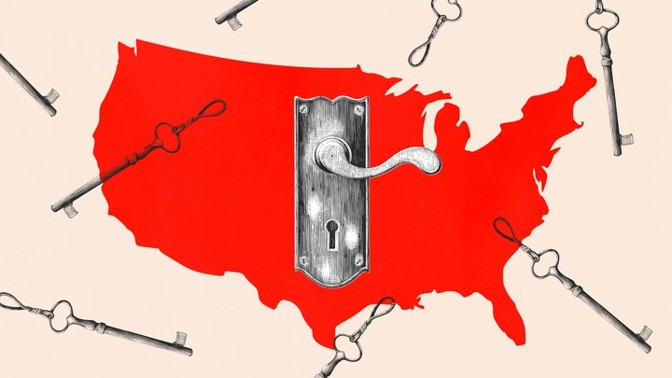
What to read if … you just want practical advice:
One question, answered: Why doesn’t the U.S. have a national lockdown?
Other countries—including Western democracies such as Italy, Spain, and France—have responded to the coronavirus crisis by shutting down entire regions or the nation as a whole. America, which currently has the most known COVID-19 cases of any country, has not.
Two health-law experts explain how America’s federalist system limits its response options:
Constitutional authority for ordering major public-health interventions, such as mass quarantines and physical distancing, lies primarily with U.S. states and localities via their “police powers.”
Today’s Atlantic-approved self-quarantine activity:
Try last year’s six-part British drama Years and Years, an eerily timely—and oddly comforting—series about family life against a backdrop of constant crisis. In the show, “simply carrying on is portrayed as the key to survival,” our critic writes.
What to read if … you’d like to read about something—anything—other than the coronavirus:
The wellness movement is booming—and so are opportunities to profit from it.
We are continuing our coverage of the coronavirus. View all of our stories related to the outbreak here. Let us know if you have specific questions about the virus—or if you have a personal experience you’d like to share with us. In particular, we’d like to hear about how the pandemic has affected your family life—whether that’s child care, partner relationships, or any other family dynamic.
This email was written by Caroline Mimbs Nyce, with help from Isabel Fattal. Sign yourself up for The Daily here
from The Atlantic https://ift.tt/2WWs2l1
It’s Tuesday, March 31. Backlogs at private laboratories have ballooned, making it difficult to treat suffering patients and contain the pandemic. Read the latest from our science and technology reporters Alexis Madrigal and Robinson Meyer.
In the rest of today’s newsletter: When the coronavirus pandemic comes to Trump country, politicization can only last so long. Plus: What’s the deal with Oscar Health and COVID-19 testing?
*
« TODAY IN POLITICS »
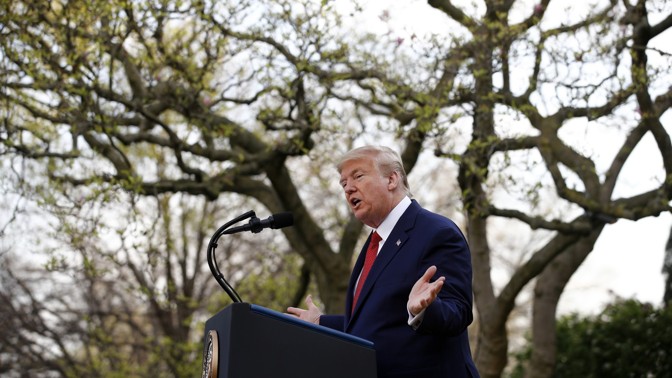
(Patrick Semansk / AP)
Thus far, the coronavirus outbreak has ravaged blue states and Democratically-leaning cities more than red states and rural areas (though the illness is spreading quickly). President Trump has spoken about the pandemic through a highly partisan lens, and has expressed belief that state and local governments haven’t been happy enough with the administration’s help, my colleague Peter Nicholas, our White House correspondent, writes:
Trump, though, is sensitive to anything he sees as ingratitude. If his administration sends planeloads of ventilators—a national resource—he wants a thank you, not a complaint about why it didn’t come sooner.
But as the virus spills widely across more red states, more Republican governors must figure out how to navigate the White House’s shifting moods.
But as the virus spills into more red states, Republican governors must figure out how to navigate his shifting moods. (That hasn’t stopped the president from taking credit for any positive development and parroting false news of progress to his base.)
The federal government can only do so much to enforce national restrictions, even if an aggressive one would help slow the pandemic’s spread. If the president wanted to enact a nationwide lockdown, akin to those in China, India and the UK, the way the federal government is designed prevents him from being able to do so.
On the economic front, drastic times call for drastic measures. Rather than shipping out one-time $1,200 checks to save the economy, here’s one idea for the Federal Reserve to stave America off long-term economic disaster, Annie Lowrey writes: Throw money out of helicopters. Really.
—Kaila Philo
*
« THE CORONAVIRUS READER »
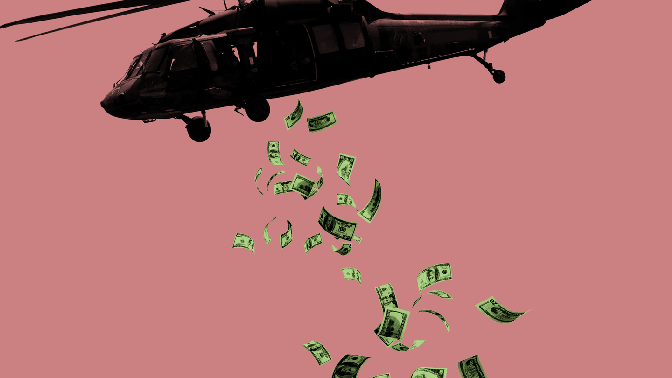
(Getty Images / The Atlantic)
+ The president has promised a website devoted to coronavirus testing. He said Google would help; instead, it was built by Oscar Health, an insurance company closely tied to son-in-law Jared Kushner.
+ There’s some amount of political genius in the support the president has managed to maintain amid national calamity, Frida Ghitis argues: He’s somehow “transmuting his calamitous failures into political gold.” Here’s how.
+ Prisons are vulnerable environments for a pandemic. The new coronavirus will be a nightmare for those who might’ve been wrongly convicted.
You can keep up with The Atlantic’s most crucial coronavirus coverage here.
*
Today’s newsletter was written by Kaila Philo, a Politics fellow. It was edited by Shan Wang, who oversees newsletters.
You can reply directly to this newsletter with questions or comments, or send a note to politicsdaily@theatlantic.com.
Your support makes our journalism possible. Subscribe here.
from The Atlantic https://ift.tt/2R34ck1
from Yahoo News - Latest News & Headlines https://ift.tt/2vWWBfk
 President Hassan Rouhani warned Sunday that "the new way of life" in Iran was likely to be prolonged, as its declared death toll from the novel coronavirus rose to 2,640. The Islamic republic is one of the countries worst-hit by the virus, which first originated in China. Iran announced its first infection cases on February 19, but a senior health official has acknowledged that the virus was likely to have already reached Iran in January.
President Hassan Rouhani warned Sunday that "the new way of life" in Iran was likely to be prolonged, as its declared death toll from the novel coronavirus rose to 2,640. The Islamic republic is one of the countries worst-hit by the virus, which first originated in China. Iran announced its first infection cases on February 19, but a senior health official has acknowledged that the virus was likely to have already reached Iran in January.
from Yahoo News - Latest News & Headlines https://ift.tt/3dESIfZ
 Researchers in the US and China reported Monday they have developed an artificial intelligence tool that is able to accurately predict which newly infected patients with the novel coronavirus go on to develop severe lung disease. Once deployed, the algorithm could assist doctors in making choices about where to prioritize care in resource-stretched health care systems, said Megan Coffee, a physician and professor at New York University's Grossman School of Medicine who co-authored a paper on the finding in the journal Computers, Materials & Continua. The tool discovered several surprising indicators that were most strongly predictive of who went on to develop so-called acute respiratory disease syndrome (ARDS), a severe complication of the COVID-19 illness that fills the lungs with fluid and kills around 50 percent of coronavirus patients who get it.
Researchers in the US and China reported Monday they have developed an artificial intelligence tool that is able to accurately predict which newly infected patients with the novel coronavirus go on to develop severe lung disease. Once deployed, the algorithm could assist doctors in making choices about where to prioritize care in resource-stretched health care systems, said Megan Coffee, a physician and professor at New York University's Grossman School of Medicine who co-authored a paper on the finding in the journal Computers, Materials & Continua. The tool discovered several surprising indicators that were most strongly predictive of who went on to develop so-called acute respiratory disease syndrome (ARDS), a severe complication of the COVID-19 illness that fills the lungs with fluid and kills around 50 percent of coronavirus patients who get it.
from Yahoo News - Latest News & Headlines https://ift.tt/2wNFNbb
from BBC News - Home https://ift.tt/33X85fl
from BBC News - Home https://ift.tt/3axPYzd
from BBC News - Home https://ift.tt/3dJ5ES2
from BBC News - Home https://ift.tt/3auJAZH
from BBC News - Home https://ift.tt/2X1Vk1X
from BBC News - Home https://ift.tt/2UQlH7Y
from BBC News - Home https://ift.tt/2QWDCJc
from BBC News - Home https://ift.tt/2xx5TPR
from BBC News - Home https://ift.tt/3bHsNm3
from BBC News - World https://ift.tt/2UOS3Qx
from BBC News - World https://ift.tt/2UO6Pad
from BBC News - World https://ift.tt/3auJAZH

One virus, two Americas
Maybe you live in a blue state, in a hard-hit, urban area, and are currently under lockdown orders from your Democratic governor. Or maybe you live in small-town, conservative America, in one of the places that’s been relatively free of COVID-19 cases, where local Republican officials are resisting further preventative measures.
Red-state and blue-state America aren’t experiencing the same pandemic, and it’s showing in the polls. National surveys reveal geographic and partisan splits in attitude, with Democrats and urban dwellers more likely to express their concern. And, perhaps even more troubling, these divides seem to be worsening.
The pandemic, and America’s response, is being swallowed up by the country’s culture wars. As our politics staff writer McKay Coppins reports today, social distancing has morphed into a political act—“a way to signal which side you’re on.”
A few things to consider as you make sense of the situation:
-
The messaging is coming from the top. Trump refers to this strain as “the China virus,” in an attempt to incite a culture war, Adam Serwer argues.
-
But it’s also part of a decade-long philosophical battle between parties. One that predates Trump altogether: “How much do the healthiest people in society owe to the most vulnerable?”
-
All of this might change if, or when, the virus hits red states. And that might happen sooner than you think: Keep your eyes on Louisiana, which Trump carried in 2016.
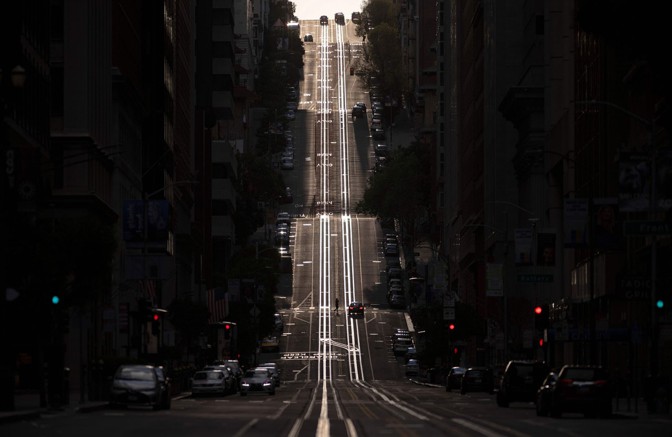
What to read if … you just want practical advice:
One question, answered: How can you fight back against misinformation about the virus?
Two experts detail steps you should take to weed out falsehoods—and help stop their spread. Their first tip:
Consider the source, and consider the source’s source. Both of these steps help guard against disinformation (the intentional spread of false information), as well as misinformation (the unintentional, inadvertent spread of false information).
Tonight’s Atlantic-approved self-quarantine activity:
This one is courtesy of our space reporter Marina Koren:
“Get your hands on a jigsaw puzzle, preferably one with 1,000 pieces. Puzzles are the perfect pandemic activity because they keep both your mind and your hands occupied for hours; it’s hard to dwell on the outbreak—and scroll through the latest headlines on your phone—when you’re laser-focused on finding that one elusive piece.”
What to read if … you’d like to read about something—anything—other than the coronavirus:
Emma Perrier spent months messaging a man she believed was a 34-year-old electrician, but who was actually a 53-year-old retail decorator. Their first in-person meeting broke her heart. But when she reached out with a warning to the Turkish model whose photos her catfish was using, things took a turn for the better.
We are continuing our coverage of the coronavirus. View all of our stories related to the outbreak here. Let us know if you have specific questions about the virus—or if you have a personal experience you’d like to share with us. In particular, we’d like to hear about how the pandemic has affected your family life—whether that’s child care, partner relationships, or any other family dynamic.
Dear Therapist

Every Monday, Lori Gottlieb answers questions from readers about their problems, big and small. This week, she does something extraordinary: answers her own question. She explains:
This week, I decided to submit my own “Dear Therapist” letter following my father’s death. As a therapist, I’m no stranger to grief, and I’ve written about its varied manifestations in this column many times.
Even so, I wanted to write about the grief I’m now experiencing personally, because I know this is something that affects everyone. You can’t get through life without experiencing loss. The question is, how do we live with loss?
And how do we do so amid a frightening pandemic? Read Lori’s advice to Lori. Write to her anytime at dear.therapist@theatlantic.com
This email was written by Caroline Mimbs Nyce, with help from Isabel Fattal and Annika Neklason, and edited by Shan Wang. Did someone forward you this newsletter? Sign yourself up for The Daily here.
from The Atlantic https://ift.tt/3av1pI7
It’s Monday, March 30. More states announced stay-at-home orders, and the White House extended its social distancing guidelines to until at least May.
In today’s newsletter: The social-distancing culture war. Plus: Take a tour of these drive-in movie theaters.
*
« TODAY IN POLITICS »

(Ina Jang)
Social distancing is a political act now.
There once was a time at the beginning of this pandemic when public health experts’ call for Americans to limit their public activity and practice rigorous social distancing hadn’t yet been swept up in the language of a culture war.
School closures came quickly across blue and red states, people of all parties quickly dispensed hand-washing advice, and “flatten the curve” seemed like a unifying rallying cry.
That rare slice of unpolarized American life is waning, my colleague McKay Coppins writes:
The consensus didn’t last long. President Trump, having apparently grown impatient with all the quarantines and lockdowns, began last week to call for a quick return to business as usual…[T]he comments set off a familiar sequence—a Democratic backlash, a pile-on in the press, and a rush in MAGA-world to defend the president. As the coronavirus now emerges as another front in the culture war, social distancing has come to be viewed in some quarters as a political act—a way to signal which side you’re on.”
Democratic strongholds—large metropolitan areas—felt the effects of the pandemic first. Now more people are dividing along familiar lines: by party, by geography, by religion, even by individual news outlet (McKay has already reported earlier this month on how the president’s news and social media allies have rallied to defend his distortions.)
Some politicians and pundits have even suggested that older Americans should be willing to risk death to jumpstart the economy. Others have painted the public health response as a move toward socialism and a sign of government overreach.
—Christian Paz
*
« SNAPSHOT »
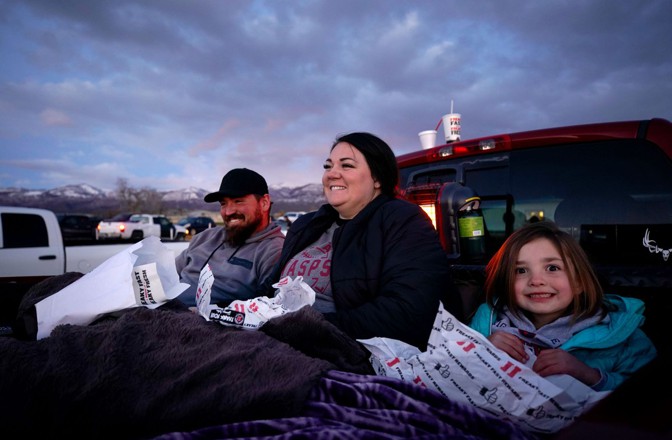
(George Frey / Getty)
The Bills family gets comfortable in the back of their truck, with temperatures in the low 30s, before the movie Onward starts at the Basin Drive In in Mount Pleasant, Utah. The outdoor theater opened early this year, despite frigid temperatures, because the COVID-19 outbreak had closed indoor theaters.
See our photo editor Alan Taylor’s collection of other drive-in moments.
*
« THE CORONAVIRUS READER »
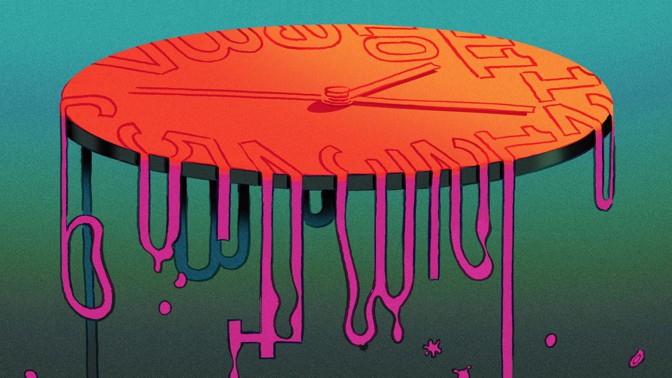
(Chloe Scheffe)
+ The threats of the coronavirus are already a lot for the living. They’re burdening those who work with the dead, too: Undertakers and funeral directors are struggling.
+ The U.S.’s community hospitals will soon face the onslaught of hospitalizations that urban hospitals face, and will have fewer resources with which to treat patients.
+ Social distancing, working from home, and general isolation all lend themselves to warping our understanding of time. Writers have been dealing that suspended state for ages. Here are some tips.
You can keep up with The Atlantic’s most crucial coronavirus coverage here.
*
Today’s newsletter was written by Christian Paz, a Politics fellow. It was edited by Shan Wang, who oversees newsletters.
You can reply directly to this newsletter with questions or comments, or send a note to politicsdaily@theatlantic.com.
Your support makes our journalism possible. Subscribe here.
from The Atlantic https://ift.tt/2JpsBvP

from Yahoo News - Latest News & Headlines https://ift.tt/39rqiD7

from Yahoo News - Latest News & Headlines https://ift.tt/2UDK0G8
 President Hassan Rouhani warned Sunday that "the new way of life" in Iran was likely to be prolonged, as its declared death toll from the novel coronavirus rose to 2,640. The Islamic republic is one of the countries worst-hit by the virus, which first originated in China. Iran announced its first infection cases on February 19, but a senior health official has acknowledged that the virus was likely to have already reached Iran in January.
President Hassan Rouhani warned Sunday that "the new way of life" in Iran was likely to be prolonged, as its declared death toll from the novel coronavirus rose to 2,640. The Islamic republic is one of the countries worst-hit by the virus, which first originated in China. Iran announced its first infection cases on February 19, but a senior health official has acknowledged that the virus was likely to have already reached Iran in January.
from Yahoo News - Latest News & Headlines https://ift.tt/3dESIfZ
from Yahoo News - Latest News & Headlines https://ift.tt/33U9hQO
 Passengers on a virus-stricken cruise liner stranded off Central America were transferred to another ship Saturday, after the US-bound vessel was given permission to pass through the Panama Canal. The Zaandam had been stuck in the Pacific Ocean since March 14 after dozens of the 1,800 people on board reported flu-like symptoms and several South American ports refused to let it dock. The ship's Dutch owner Holland America said Friday four passengers had died and two more had tested positive for COVID-19.
Passengers on a virus-stricken cruise liner stranded off Central America were transferred to another ship Saturday, after the US-bound vessel was given permission to pass through the Panama Canal. The Zaandam had been stuck in the Pacific Ocean since March 14 after dozens of the 1,800 people on board reported flu-like symptoms and several South American ports refused to let it dock. The ship's Dutch owner Holland America said Friday four passengers had died and two more had tested positive for COVID-19.
from Yahoo News - Latest News & Headlines https://ift.tt/2Uuy4YN

from Yahoo News - Latest News & Headlines https://ift.tt/3as9gG3

from Yahoo News - Latest News & Headlines https://ift.tt/3auZ7bG

from Yahoo News - Latest News & Headlines https://ift.tt/39vIAmR













